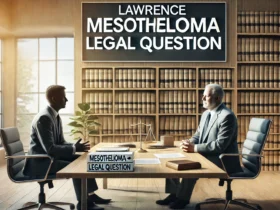Introduction
Clinton asbestos legal question deals with understanding how asbestos-related issues are handled in the legal system. Asbestos is a material used in the past for insulation and fireproofing. It is now known to cause serious health problems like lung cancer and mesothelioma. When people are affected by asbestos, they often need to seek legal help to get compensation for their health issues.
It is important to understand Clinton asbestos legal question because knowing the legal aspects can help individuals and families get justice and financial support. Legal cases involving asbestos can be complex, and each case may be different based on when and where the exposure occurred. Understanding the legal issues can help people navigate the process and ensure they get the compensation they deserve.
Learning about the Clinton asbestos legal question can make a big difference for those dealing with asbestos-related health problems. It can also help prevent future issues by raising awareness about asbestos risks and legal rights. Overall, understanding these legal issues is crucial for anyone affected by asbestos exposure.
What Is Asbestos?
Asbestos is a group of minerals that occur naturally as bundles of fibers. These fibers are known for being heat-resistant and durable, which is why asbestos was used in building materials, insulation, and various industrial products. There are several types of asbestos, including chrysotile (white asbestos), amosite (brown asbestos), crocidolite (blue asbestos), and others. Each type has different properties but all can be harmful.
Exposure to asbestos can lead to serious health risks. When asbestos fibers are inhaled, they can become trapped in the lungs and cause damage over time. This can lead to diseases such as asbestosis, which is a chronic lung condition, and various types of cancer, including lung cancer and mesothelioma, a rare cancer that affects the lining of the lungs or abdomen. The health risks are often severe and can take many years to develop. It is important to be aware of these risks, especially in environments where asbestos is present or was used.
Historical Context Of Asbestos Use In Clinton
In Clinton and the surrounding areas, asbestos was widely used during the 20th century due to its insulating and fire-resistant properties. Factories and construction projects frequently incorporated asbestos in building materials, insulation, and other products. This widespread use was common in many industrial towns, including Clinton, which had significant manufacturing and construction activity.
One key historical event in Clinton related to asbestos was the rise of health concerns in the 1970s. During this time, medical studies began to reveal the serious health risks associated with asbestos exposure. The increasing awareness led to stricter regulations and eventually, the phasing out of asbestos in many industries.
Another notable event was the legal actions taken by former workers and residents who suffered from asbestos-related illnesses. These lawsuits brought significant attention to the issue and resulted in efforts to improve safety standards and provide compensation for affected individuals. The historical use of asbestos in Clinton highlights the need for ongoing awareness and action to address the long-term effects of asbestos exposure.Top of FormBottom of Form
Legal Implications Of Asbestos Exposure
Asbestos-related legal issues revolve around the rights and compensation for individuals affected by asbestos exposure. Due to the severe health risks associated with asbestos, there are specific legal avenues for seeking justice and compensation. These legal issues can include proving that exposure to asbestos caused health problems, determining liability, and receiving appropriate damages.
There are several types of asbestos-related claims:
1. Personal Injury Claims: These are filed by individuals who have developed health problems, such as asbestosis or lung cancer, due to asbestos exposure. The goal is to get compensation for medical expenses, pain and suffering, and lost wages.
2. Wrongful Death Claims: If someone has died due to an asbestos-related illness, their family members may file a wrongful death claim. This seeks compensation for loss of income, funeral expenses, and emotional suffering caused by the death.
3. Property Damage Claims: These claims involve damage to property caused by asbestos. Property owners may seek compensation for the cost of removing asbestos or repairing damage caused by asbestos-containing materials.
Understanding these legal implications helps affected individuals and families navigate the complexities of asbestos-related claims and seek the justice they deserve.
Clinton’s Legal Framework For Asbestos Claims
Clinton’s legal framework for asbestos claims is shaped by both state-specific laws and key legal precedents. In general, asbestos claims in Clinton, like elsewhere, are governed by a combination of state regulations and court decisions that define how these cases are handled.
State-specific laws and regulations regarding asbestos in Clinton are designed to address issues related to exposure, safety standards, and compensation. These laws cover the management of asbestos in buildings, regulations for handling asbestos during renovations, and requirements for informing workers and the public about asbestos risks. The state may have specific deadlines for filing claims and particular standards for proving exposure and health impacts.
Key legal precedents and cases in Clinton have helped shape the understanding of asbestos-related claims. Notable cases in the region have set important standards for how evidence must be presented and how damages are assessed. These precedents often involve rulings on the responsibilities of employers, manufacturers, and property owners regarding asbestos. They also influence how courts handle issues of liability and compensation.
Together, these laws and precedents provide a framework for addressing asbestos claims and ensure that affected individuals have a pathway to seek justice and compensation in Clinton.
How To File An Asbestos Lawsuit In Clinton
Filing an asbestos lawsuit in Clinton involves several important steps to ensure that your claim is properly handled. Here is a step-by-step process for filing a claim:
1. Consult an Attorney: The first step is to seek legal advice from an attorney who specializes in asbestos-related cases. They can help you understand your rights, evaluate the strength of your case, and guide you through the legal process.
2. Gather Medical Records: Collect medical records that show a diagnosis of an asbestos-related illness, such as asbestosis or lung cancer. These documents are crucial for proving that your health problems are due to asbestos exposure.
3. Collect Evidence of Exposure: Obtain evidence of asbestos exposure, including employment records, work history, or documentation of the locations where you were exposed to asbestos. This helps establish a link between your exposure and your illness.
4. File the Complaint: Your attorney will help you draft and file a legal complaint with the appropriate court. This document outlines your claims, the parties involved, and the damages you are seeking.
5. Discovery Process: During this phase, both parties exchange information and evidence. This can include depositions, requests for documents, and interrogatories.
6. Negotiate a Settlement or Go to Trial: Many asbestos cases are settled out of court. Your attorney will negotiate on your behalf to reach a fair settlement. If a settlement cannot be reached, your case will proceed to trial.
Required documentation and evidence for an asbestos lawsuit include:
- Medical Records: Proof of diagnosis and treatment related to asbestos exposure.
- Exposure Records: Documentation of where and when you were exposed to asbestos.
- Employment History: Records showing your work history in environments where asbestos was present.
- Witness Statements: Testimonies from individuals who can support your claims of exposure.
Ensuring you have all necessary documentation and working with a knowledgeable attorney can help make the process of filing an asbestos lawsuit in Clinton more effective.
Types Of Compensation For Asbestos Claims
In asbestos claims, there are several types of compensation that you may be eligible to receive. Here are the main categories:
1. Medical Expenses: This includes compensation for the cost of diagnosis, treatment, and ongoing care related to asbestos-related diseases. It covers hospital bills, medication, surgeries, and other medical costs incurred due to your condition.
2. Pain and Suffering: This compensation is for the physical pain and emotional distress caused by asbestos-related illnesses. It acknowledges the impact that the disease has on your quality of life and well-being.
3. Lost Wages: If your illness prevents you from working or reduces your ability to work, you may be compensated for lost wages. This includes both past lost income and future loss of earning potential due to your condition.
Settlement Vs. Court Judgment:
- Settlement: Many asbestos cases are resolved through a settlement agreement. This involves negotiating with the responsible parties or their insurers to reach a financial agreement without going to trial. Settlements can provide a quicker resolution and immediate compensation but may involve compromises.
- Court Judgment: If a settlement cannot be reached, the case may go to trial. A court judgment results from a trial where a judge or jury determines the outcome. This can lead to a potentially larger award, but the process is longer and more uncertain.
Each option has its benefits and risks. Settlements offer faster resolution and guaranteed payment, while court judgments may result in higher compensation but come with the risks of a lengthy legal process and no guaranteed outcome.
Choosing The Right Legal Representation
Choosing the right legal representation for an asbestos case is crucial to achieving a successful outcome. Here are some important factors to consider when selecting a lawyer:
1. Experience with Asbestos Cases: It is essential to choose a lawyer who has substantial experience handling asbestos-related claims. Asbestos cases can be complex due to the need to prove exposure, link it to health issues, and navigate specialized legal and medical aspects. An attorney with a track record in asbestos cases will have the knowledge to effectively manage these complexities.
2. Reputation and Success Rate: Research the lawyer’s reputation and past success in asbestos litigation. Look for reviews, testimonials, and case outcomes. A lawyer with a strong track record in securing favorable settlements or verdicts is likely to be more effective.
3. Expertise in Relevant Laws: Ensure the lawyer is well-versed in the specific laws and regulations related to asbestos in your state. Understanding local regulations and legal precedents is crucial for building a strong case.
4. Communication and Personal Rapport: Select a lawyer who communicates clearly and keeps you informed throughout the legal process. Personal rapport is also important, as you will need to work closely with your attorney.
5. Resources and Support: Check if the lawyer’s firm has the necessary resources, such as access to expert witnesses and medical professionals, to support your case.
Choosing a lawyer with experience in asbestos cases is vital, as it ensures they understand the intricacies of such claims and can effectively advocate for your rights and compensation.
Recent Developments And Trends In Asbestos Litigation
Recent developments and trends in asbestos litigation can significantly impact how cases are handled in Clinton and beyond. Here’s a look at some of these key changes:
1. Recent Case Law or Regulatory Changes in Clinton: Recent case law in Clinton has focused on refining the standards for proving asbestos exposure and linking it to health conditions. Courts have increasingly required more detailed evidence to establish causation. Regulatory changes may include stricter guidelines on asbestos management and more rigorous reporting requirements for exposure incidents. These developments affect how claims are filed and evaluated, often making it necessary to present more comprehensive documentation and expert testimony.
2. National Trends Affecting Local Cases: Nationally, there has been a trend towards consolidating asbestos claims into specialized courts or settlement trusts, which can impact local litigation processes. This consolidation often speeds up the claims process but can also lead to standardized settlements that may not fully reflect the specifics of individual cases. Additionally, there is a growing emphasis on pre-trial settlements and mediation, aiming to resolve cases without lengthy court battles. Changes in federal regulations, such as updated occupational safety standards or revised environmental rules, also influence local asbestos claims by setting new benchmarks for exposure limits and employer responsibilities.
Understanding these recent developments and national trends can help in navigating the current legal landscape for asbestos claims and adapting strategies to secure the best possible outcome.
Resources And Support For Asbestos Victims
Resources and support for asbestos victims in Clinton are crucial for navigating the challenges associated with asbestos-related health issues. Here are some key resources available:
1. Support Groups and Organizations in Clinton:
- Local Advocacy Groups: Organizations such as the Clinton Asbestos Awareness Group offer support and information to individuals affected by asbestos. They provide resources, connect victims with others facing similar challenges, and advocate for better policies and regulations.
- National Organizations: National groups like the Asbestos Disease Awareness Organization (ADAO) have local chapters or affiliates that can offer support and resources specific to Clinton. These organizations provide education, legal advice, and community support.
2. Financial And Medical Resources Available:
- Financial Assistance: Victims can access various forms of financial assistance, including compensation funds set up by asbestos manufacturers or employers, which provide financial support for medical expenses and lost wages. Additionally, there are legal avenues to seek damages through lawsuits or settlements.
- Medical Resources: Medical facilities in Clinton may offer specialized care for asbestos-related illnesses. Hospitals and clinics may have programs dedicated to treating asbestosis, mesothelioma, and other conditions. Some organizations may also assist with locating specialized doctors and treatment centers.
These resources help asbestos victims manage the financial and emotional impacts of their conditions, providing both practical support and community connections.
Conclusion
In conclusion, addressing the Clinton asbestos legal question involves understanding several key aspects. First, it’s important to know that Clinton asbestos issues are governed by specific state laws and regulations designed to handle asbestos exposure and related health problems. These legal frameworks cover how claims are filed and what evidence is needed. Additionally, key historical events in Clinton show the impact of asbestos use and the evolution of legal standards over time. Asbestos claims typically involve seeking compensation for medical expenses, pain and suffering, and lost wages.
For individuals affected by asbestos in Clinton, it is crucial to seek expert legal help. A lawyer with experience in handling asbestos cases can provide guidance on how to proceed. Gathering all relevant medical and exposure documentation is essential for building a strong case. You should also be aware of both settlement options and court judgments as they offer different paths to compensation. For ongoing support, local and national organizations can provide resources and connect you with other affected individuals. Taking these steps can help ensure that you receive the support and compensation you deserve.
Frequently Asked Questions (Faqs)
What Are The Common Types Of Asbestos-related Diseases?
Common diseases include asbestosis (a chronic lung condition), lung cancer, and mesothelioma (a rare cancer affecting the lining of the lungs or abdomen).
How Do I Know If I Have Been Exposed To Asbestos?
Exposure can be confirmed through medical evaluations and reviewing your work history or living conditions. If you worked in environments known for asbestos use, you might have been exposed.
What Should I Do If I Suspect I Have An Asbestos-related Illness?
Seek medical attention immediately. A doctor can diagnose and recommend treatment for asbestos-related conditions. It’s also important to consult a lawyer experienced in asbestos cases.
How Do I File An Asbestos Lawsuit In Clinton?
Start by consulting an attorney who specializes in asbestos cases. They will guide you through the process, including gathering medical records, proving exposure, and filing the necessary legal documents.
What Kind Of Compensation Can I Receive From An Asbestos Lawsuit?
Compensation may cover medical expenses, pain and suffering, and lost wages. The amount varies based on the severity of your illness and the specifics of your case.
Is There A Time Limit To File An Asbestos Claim?
Yes, there are statutes of limitations that vary by state. In Clinton, it’s important to act promptly to ensure you meet the deadlines for filing a claim.
To read more, visit our blog page. We do have more topics!












Got a Questions?
Find us on Socials or Contact us and we’ll get back to you as soon as possible.